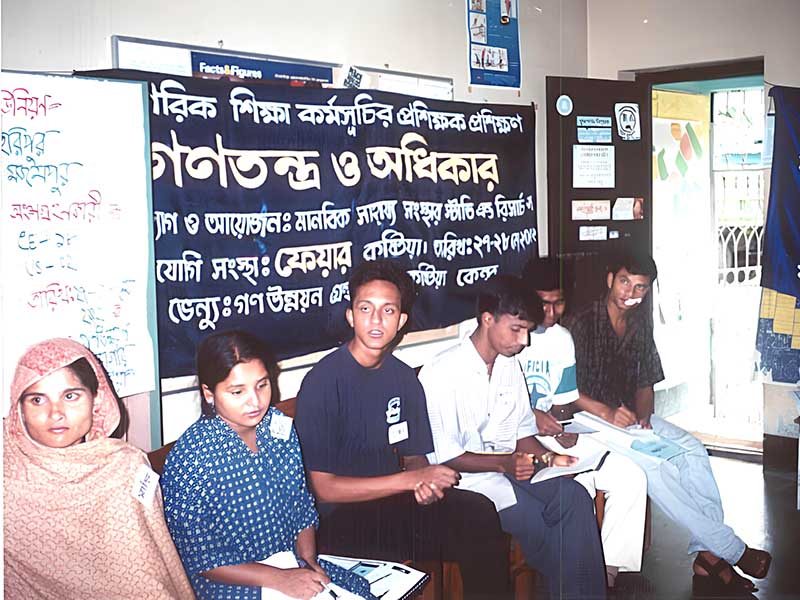
Civic Voter Education – Empowering Democracy in Kushtia
Project Background and Problem Statement
Civic Voter Education plays a vital role in ensuring fair and free elections, the cornerstone of a thriving democracy. However, for elections to genuinely reflect the will of the people, a well-educated and conscious civic society is indispensable. In Bangladesh, many communities, particularly in rural areas, lack awareness of voter rights, democratic practices, and human rights, which hinders their active participation in the electoral process.
Recognizing this need, Friends Association for Integrated Revolution (FAIR) launched the Civic Voter Education Project to foster civic engagement and democratic culture in Kushtia Sadar Upazila. The project, implemented across ten unions, aimed to educate and empower citizens with the knowledge and skills necessary to uphold democratic values and participate meaningfully in elections.
Supported by the European Commission through Manabik Shahajya Sangstha (MSS), the project focused on raising civic awareness, building capacity among trainers, and mobilizing communities to strengthen democratic practices.
Objectives of the Project
Primary Objective:
To enhance democratic culture and promote fair and free elections by educating citizens about voter rights and responsibilities.
Specific Objectives:
- Build civic awareness among community members on human rights, voter rights, and democratic values.
- Develop a network of skilled trainers to sustain voter education initiatives.
- Mobilize communities to take collective action in supporting democratic processes.
Working Area
Target Location:
10 unions in Kushtia Sadar Upazila.
Project Duration
June 2002 – December 2002
Donor
The project was funded by the European Commission through Manabik Shahajya Sangstha (MSS).
Key Activities
1. Training of Trainers (TOT)
- Organized TOT sessions to develop 50 skilled trainers with expertise in democracy, voter rights, and civic education.
- Trainers were equipped with practical knowledge and tools to deliver impactful sessions within their communities.
2. Group Formation
- Established community groups as platforms for discussion and education on voter rights and democratic practices.
- Groups served as hubs for sharing experiences and encouraging civic engagement among community members.
3. Education Sessions
- Conducted interactive education sessions on human rights, voter responsibilities, and democratic values.
- Sessions focused on practical applications, such as how to participate in elections and uphold electoral integrity.
4. Community Mobilization
- Engaged local communities through workshops, awareness campaigns, and participatory discussions.
- Promoted collective action to support transparent and fair electoral processes.
Achievements and Impact
- Community Education: Educated over 13,500 community members on democracy, voter rights, and civic responsibilities, fostering a culture of informed participation.
- Trainer Development: Developed the skills of 50 trainers, creating a sustainable network to continue voter education initiatives beyond the project period.
- Civic Engagement: Empowered communities to actively participate in democratic processes and advocate for free and fair elections.
- Enhanced Awareness: Increased understanding of the importance of voting and civic responsibilities, contributing to stronger democratic practices.
Challenges Faced
- Cultural Barriers: Resistance from some community members to engage in discussions about democracy and civic rights due to traditional mindsets.
- Time Constraints: Limited project duration posed challenges in reaching all target groups comprehensively.
- Logistical Challenges: Difficulty in coordinating activities across ten unions within a short timeframe.
Lessons Learned
- Community Involvement is Crucial: Actively involving community members in project activities enhances ownership and sustainability.
- Training is a Key Investment: Developing skilled trainers ensures the continuity of education initiatives and amplifies project impact.
- Localized Approaches Work Best: Tailoring activities to the specific needs and contexts of communities increases engagement and effectiveness.
Conclusion and Future Directions
The Civic Voter Education Project has significantly contributed to fostering civic awareness and promoting democratic values in Kushtia. By educating community members, developing skilled trainers, and mobilizing local communities, the project has laid a strong foundation for sustained democratic engagement.
Future Directions:
- Expand the project to other unions and upazilas to broaden its impact.
- Strengthen partnerships with local stakeholders to enhance resource mobilization.
- Develop advanced training modules to address emerging challenges in voter education and democratic participation.
Call to Action
Join us in empowering communities to uphold democratic values and ensure free and fair elections. Contact FAIR today to learn how you can support our initiatives in civic education and democracy building.
